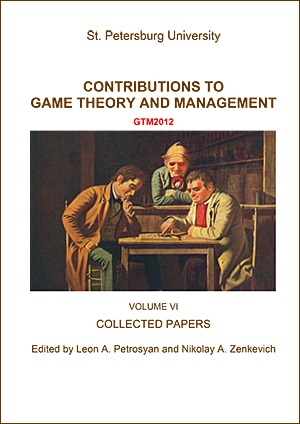A Model of Coopetitive Game and the Greek Crisis
Abstract
In the present work we propose an original economic coopetitive model applied to the Greek crisis. This model is based on normal form game theory and conceived at a macro level. We aim at suggesting feasible solutions in a super-cooperative perspective for the divergent interests which drive the economic policies of the countries in the euro area.
Keywords:
Greek crisis, euro area, trade imbalances, coopetition, coopetitive games, normal form games, Kalai-Pareto solutions
Downloads
References
Downloads
Published
How to Cite
Issue
Section
License
Articles of "Contributions to Game Theory and Management" are open access distributed under the terms of the License Agreement with Saint Petersburg State University, which permits to the authors unrestricted distribution and self-archiving free of charge.




